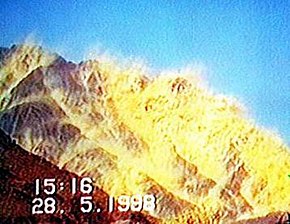Kahuta Project
| Project 706 | |
|---|---|

After nine years of effort Project-706 was vindicated in Pakistan's first nuclear test, Chagai-I, 28 May 1998.
|
|
| Active | 1974–1983 |
| Country | Pakistan |
| Allegiance |
|
| Branch | Pakistan Army Corps of Engineers |
| Nickname(s) | Kahuta Project |
| Colours Code | Green and White |
| Engagements |
Cold War Operation Opera Operation Smiling Buddha Soviet war in Afghanistan |
| Disbanded | 11 March 1983 |
| Commanders | |
| Notable commanders |
General Zahid Ali Akbar Khan |
| Insignia | |
| Insignia |  |
Project-706, also known as Project-726 was a codename of a project to develop Pakistan's first atomic bomb using uranium. At the same time, Pakistani nuclear technology scientists and engineers gained expertise in the use of reactor-grade plutonium and successfully produced weapons grade plutonium by the early 1980s.
It was a major scientific effort of Pakistan. Project-706 refers specifically to the period from 1974–1983 when it was under the control of former prime minister Zulfikar Ali Bhutto, and later on under the military administration of General Muhammad Zia-ul-Haq. The project's roots lay in scientists' fears since 1967 that India was also developing nuclear weapons of its own. Developing nuclear technology for Pakistan was a main goal and of Prime minister Zulfikar Ali Bhutto who initiated the scientific research in 1972.
Before the launching of Project-706 in 1974, the initial scientific research, starting from 1972, was directed and organized by renowned Pakistani scientist Abdus Salam. From 1974, the research was led by engineers Munir Ahmad Khan of PAEC and Abdul Qadeer Khan of KRL. Time magazine has called Project-706 Pakistan's equivalent of the United States Manhattan Project. The project initially cost US$450 million (raised by both Libya and Saudi Arabia) which was approved by Bhutto in 1972.
Project-706 led to the creation of multiple production and research sites that operated in extreme secrecy and . Apart from research and development the project was also charged with gathering intelligence on Indian nuclear efforts. The Project was disbanded when the Pakistan Atomic Energy Commission (PAEC) carried out the first cold test of a miniature nuclear device on 11 March 1983. Scientists and military officers who participated in the Project were given higher promotion in their respective services, and conferred with high civil decorations by the Government of Pakistan.
...
Wikipedia
